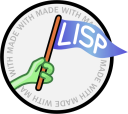Welcome to Common-Lisp.net! (original) (raw)

Introduction
Welcome to the amazing world of Common Lisp, the programmable programming language.
This site is one among many gateways to Common Lisp. Its goal is to provide the Common Lisp community with development resources and to work as a starting point for new programmers.
Latest Common-Lisp.net news
2025-05-20
European Lisp Symposium has just concluded and the Common Lisp Foundation is having a physical meeting after it to discuss priorities for the Foundation and the common-lisp.net website.
2025-03-12
NOTE: The new host has stricter SSH key requirements than the old one, so for example older, weaker RSA keys may no longer work. We don't plan to enable support for legacy keys which are considered insecure by today's standards. If this appears to affect you, please generate a new keypair (RSA, ED25519) and send the public key to the clo-devel mailing list (which we assume you're already on if you had ssh access to the old host), or ask for support at the IRC channel noted in the previous News item.
2025-03-10
The toplevel common-lisp.net domain (which you're presumably looking at right now) has been changed to point to our new host, the same as gitlab.common-lisp.net and future.common-lisp.net. Most ssh user accounts (with intact UIDs) and their home directories were copied to the new host in late December, 2024. If you need to synchronize any interim changes from the old host, you should be able to use rsync and you can access the old host with your existing ssh key at e.g. legacy.common-lisp.net (any default *.common-lisp.net is still pointing to the old host). You may need to update your ~/.ssh/config accordingly to point to the legacy hostname.
2025-03-03
Gitlab has been moved to a new host. Other services will follow to this new host. Please update your remotes to use gitlab.common-lisp.net if they were using bare common-lisp.net previously. Follow discussion of server migration at the #common-lisp.net channel on libera.chat IRC.
Latest Lisp news
What is Common Lisp?
Common Lisp is the modern, multi-paradigm, high-performance,compiled, ANSI-standardized, most prominent (along with Scheme) descendant of the long-running family of Lisp programming languages.
Common Lisp is known for being extremely flexible, having excellent support for object oriented programming, and fast prototyping capabilities. It also sports an extremely powerful macro system that allows you to tailor the language to your application, and a flexible run-time environment that allows modification and debugging of running applications (excellent for server-side development and long-running critical software). It is a multi-paradigm programming language that allows you to choose the approach and paradigm according to your application domain.
Curious? Get started!
Services
- Project hosting for open source / free software Common Lisp projects.
- Mailing lists forCommon Lisp related topics.
Support
If you need technical support, please contact our admins.
About this site
Check out our about page.
"Programs must be written for people to read, and only incidentally for machines to execute."
"That language is an instrument of human reason, and not merely a medium for the expression of thought, is a truth generally admitted."
- George Boole, quoted in Iverson's Turing Award Lecture
"One of the most important and fascinating of all computer languages is Lisp (standing for "List Processing"), which was invented by John McCarthy around the time Algol was invented."
- Douglas Hofstadter, Godel, Escher, Bach
"Lisp is a programmable programming language."
- John Foderaro, CACM, September 1991
"Lisp isn't a language, it's a building material."
- Alan Kay
"Any sufficiently complicated C or Fortran program contains an ad hoc informally-specified bug-ridden slow implementation of half of Common Lisp."
- Philip Greenspun (Greenspun's Tenth Rule of Programming)
"Lisp is worth learning for the profound enlightenment experience you will have when you finally get it; that experience will make you a better programmer for the rest of your days, even if you never actually use Lisp itself a lot."
- Eric Raymond, "How to Become a Hacker"
"Lisp is a programmer amplifier."
- Martin Rodgers
"Common Lisp, a happy amalgam of the features of previous Lisps."
- Winston & Horn, Lisp
"Lisp doesn't look any deader than usual to me."
- David Thornley
"SQL, Lisp, and Haskell are the only programming languages that I've seen where one spends more time thinking than typing."
- Philip Greenspun
"Don't worry about what anybody else is going to do. The best way to predict the future is to invent it."
- Alan Kay
"The greatest single programming language ever designed."
- Alan Kay, on Lisp
"I object to doing things that computers can do."
- Olin Shivers
"Lisp is a language for doing what you've been told is impossible."
- Kent Pitman
"Lisp is the red pill."
- John Fraser
"Within a couple weeks of learning Lisp I found programming in any other language unbearably constraining."
- Paul Graham
"Programming in Lisp is like playing with the primordial forces of the universe. It feels like lightning between your fingertips. No other language even feels close."
- Glenn Ehrlich
"A Lisp programmer knows the value of everything, but the cost of nothing."
- Alan Perlis
"Lisp is the most sophisticated programming language I know. It is literally decades ahead of the competition ... it is not possible (as far as I know) to actually use Lisp seriously before reaching the point of no return."
- Christian Lynbech, Road to Lisp
"[Lisp] has assisted a number of our most gifted fellow humans in thinking previously impossible thoughts."
- Edsger Dijkstra, CACM, 15:10
"The limits of my language are the limits of my world."
- Ludwig Wittgenstein, Tractatus Logico-Philosophicus 5.6, 1918